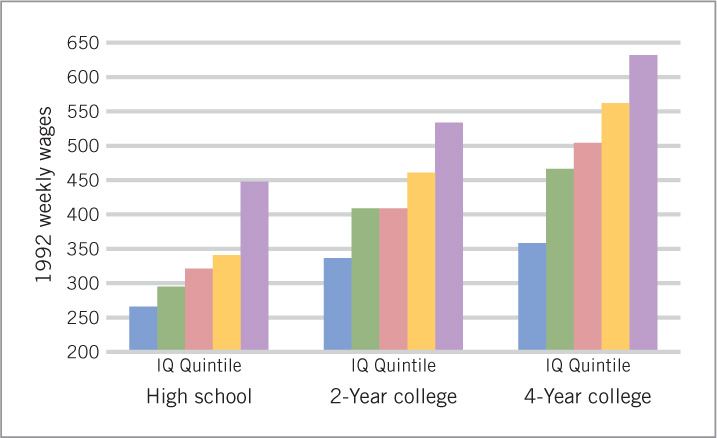IQ Scores as Predictors of Important Outcomes
Claims that an IQ score is a strong predictor of academic, economic, and occupational success are based on solid evidence (Sackett, Borneman, & Connelly, 2008; F. L. Schmidt & Hunter, 2004). As noted earlier, IQ scores correlate positively and quite strongly with school grades and achievement test performance, both at the time of the test and years later (Geary, 2005); for example, IQ and achievement test performance typically correlate between 0.50 and 0.60 (Deary et al., 2007). IQ scores also correlate positively with long-term educational outcomes. In the United States, a person’s IQ score in 6th grade correlates about 0.60 with the years of education that the person eventually completes (Jencks, 1979). Substantial relations between IQ score and performance in intellectually demanding occupations are present not only when the person is hired but for at least 10 years after entry into the occupation (Sackett et al., 2008).

In part, the positive relation between IQ score and occupational and economic success stems from the fact that standardized test scores serve as gatekeepers, determining which students gain access to the training and credentials required for entry into lucrative professions. Even among people who initially have the same job, however, those with higher IQ scores tend to perform better, earn more money, and receive better promotions (F. L. Schmidt & Hunter, 2004; Wilk, Desmarais, & Sackett, 1995).
A child’s IQ score is more closely related to the child’s later occupational success than is the socioeconomic status of the child’s family, the school the child attends, or any other variable that has been studied (Ceci, 1993). These relations hold even at the top of the test score distribution. Although popular books such as Outliers (Gladwell, 2008) claim that people with fairly high test scores achieve grades and occupational success equivalent to those of people with very high scores, empirical research indicates that even at the top of the distribution, the higher the test score, the higher that subsequent achievement is likely to be (Arneson, Sackett, & Beatty, 2011).
self-discipline ability to inhibit actions, follow rules, and avoid impulsive reactions 
As strong a predictor of academic, economic, and occupational success as IQ score is, intelligence is far from the only influence. A child’s other characteristics, such as motivation to succeed, conscientiousness, intellectual curiosity, creativity, physical and mental health, and social skills, also exert important influences (Roberts et al., 2007; Sternberg, 2004; von Stumm, Hell, & Charmorro-Premuzic, 2011). For instance, self-discipline—the ability to inhibit actions, follow rules, and avoid impulsive reactions—is more predictive of changes in report card grades between 5th and 9th grades than is IQ score, though IQ score is more predictive of changes in achievement test scores over the same period (Duckworth, Quinn, & Tsukayama, 2012). Similarly, “practical intelligence”—skills that are useful in everyday life but that are not measured by traditional intelligence tests, such as accurately reading other people’s emotions and intentions and motivating others to work effectively as a team—predicts occupational success beyond the influence of IQ score (Cianciolo et al., 2006; Sternberg, 2003). Characteristics of the environment are similarly influential: parents’ encouragement and modeling of productive careers predict their children’s occupational success (Kalil, Levine, & Ziol-Guest, 2005).
Figure 8.4 illustrates how the same set of data can simultaneously provide evidence for the importance of IQ score and other factors. Consistent with the importance of IQ, the figure shows that, among people with the same level of education, those with higher IQ scores earn more money. Consistent with the importance of other factors, the figure shows that, among people with comparable IQ scores, those who complete more years of education earn more money. Thus, while IQ is a key contributor to educational, occupational, and economic success, numerous social and motivational factors are also crucial.
308
review:
IQ scores are positively related to grades in school and achievement test performance, both at the time of the test and in the future. They are also positively related to occupational success in adulthood. However, they are not the only influence on these outcomes. Intellectual curiosity, creativity, self-discipline, social skills, practical intelligence, and a variety of other factors also contribute.